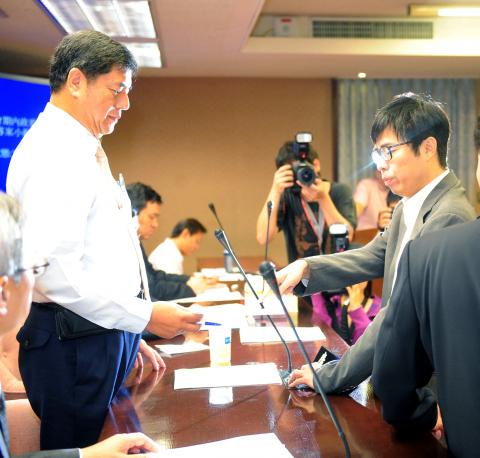Chinese Nationalist Party (KMT) Legislator Chang Ching-chung (張慶忠) yesterday triggered fresh controversy by passing a KMT proposal at a legislative committee meeting he was chairing to probe the signing of the cross-strait service trade agreement and abruptly calling the session to an end while Democratic Progressive Party (DPP) Legislator Tuan Yi-kang (段宜康) was still speaking at the podium.
Amid the ongoing disputes over the trade pact and the government’s handling of it, a commission was created under the legislature’s Internal Administration Committee to investigate the criticisms and concerns voiced about the cross-strait negotiations that led to the deal’s signing.
Since the majority of government agencies have yet to submit the documents for the probe requested by the commission, the committee last week decided to extend the submission deadline from May 31 to Aug. 31, when it will be DPP Legislator Chen Chi-mai’s (陳其邁) turn to serve as committee chair.

Photo: Wang Min-wei, Taipei Times
However, KMT legislators on the committee yesterday tabled a proposal to change the deadline back to its original date, triggering protests from their DPP counterparts, who took turns speaking at the podium to explain why they are opposed to moving the deadline back.
As Tuan was speaking, Chang suddenly asked the committee to vote on the KMT motion and quickly declared that it had passed, so the deadline was restored to May 31.
“Do you know the price you have to pay to run a tank through the committee meeting?” Tuan said in reaction to Chang’s move.
“This is too much, how could you hold a vote and declare a motion passed while a legislator is still talking on the podium?” DPP Legislator Lee Chun-yi (李俊俋) said.
Ignoring the protests, Chang called the meeting to an end and promptly left the room.
“Chang has planted a bomb in the Internal Administration Committee,” Tuan said. “We will see what happens on Wednesday [during the next meeting].”
After the meeting, DPP lawmakers condemned what they called the KMT’s “rude” behavior at a press conference.
“It’s clear that by changing the document request deadline from Aug. 31 — the date agreed upon at last week’s committee meeting — to May 31, the KMT is trying to prevent the public from knowing the truth behind the [cross-strait service trade pact] negotiations,” Chen said.
If the deadline is at the end of the month, there will not be enough time to request and collect the required documents, he added.
Chen said he would convene another committee meeting next week to again extend the document request deadline.
There is only one reason the KMT wants to move the deadline forward: To pass the supervision statute and the service trade pact in the current legislative session or an in extra session, if there is one, Lee added.
“I’d like to remind KMT legislators that the ‘black-box procedure’ [critics’ term for the bilateral trade negotiations] is what triggered the Sunflower movement. They should not have produced another black box,” Lee said.
Additional reporting by Chris Wang

The CIA has a message for Chinese government officials worried about their place in Chinese President Xi Jinping’s (習近平) government: Come work with us. The agency released two Mandarin-language videos on social media on Thursday inviting disgruntled officials to contact the CIA. The recruitment videos posted on YouTube and X racked up more than 5 million views combined in their first day. The outreach comes as CIA Director John Ratcliffe has vowed to boost the agency’s use of intelligence from human sources and its focus on China, which has recently targeted US officials with its own espionage operations. The videos are “aimed at

STEADFAST FRIEND: The bills encourage increased Taiwan-US engagement and address China’s distortion of UN Resolution 2758 to isolate Taiwan internationally The Presidential Office yesterday thanked the US House of Representatives for unanimously passing two Taiwan-related bills highlighting its solid support for Taiwan’s democracy and global participation, and for deepening bilateral relations. One of the bills, the Taiwan Assurance Implementation Act, requires the US Department of State to periodically review its guidelines for engagement with Taiwan, and report to the US Congress on the guidelines and plans to lift self-imposed limitations on US-Taiwan engagement. The other bill is the Taiwan International Solidarity Act, which clarifies that UN Resolution 2758 does not address the issue of the representation of Taiwan or its people in

US Indo-Pacific Commander Admiral Samuel Paparo on Friday expressed concern over the rate at which China is diversifying its military exercises, the Financial Times (FT) reported on Saturday. “The rates of change on the depth and breadth of their exercises is the one non-linear effect that I’ve seen in the last year that wakes me up at night or keeps me up at night,” Paparo was quoted by FT as saying while attending the annual Sedona Forum at the McCain Institute in Arizona. Paparo also expressed concern over the speed with which China was expanding its military. While the US

SHIFT: Taiwan’s better-than-expected first-quarter GDP and signs of weakness in the US have driven global capital back to emerging markets, the central bank head said The central bank yesterday blamed market speculation for the steep rise in the local currency, and urged exporters and financial institutions to stay calm and stop panic sell-offs to avoid hurting their own profitability. The nation’s top monetary policymaker said that it would step in, if necessary, to maintain order and stability in the foreign exchange market. The remarks came as the NT dollar yesterday closed up NT$0.919 to NT$30.145 against the US dollar in Taipei trading, after rising as high as NT$29.59 in intraday trading. The local currency has surged 5.85 percent against the greenback over the past two sessions, central